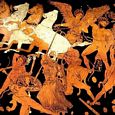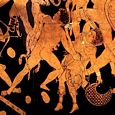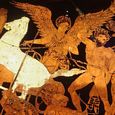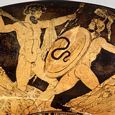PORPHYRION
Greek Name
Πορφυριων
Transliteration
Porphyriôn
Latin Spelling
Porphyrion
Translation
Surging (porphyreôs)
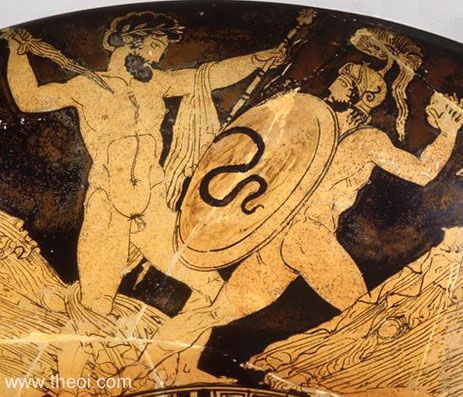
PORPHYRION was the king of the Gigantes (Giants) of Pallene who waged war on the gods. He was struck down by Herakles and Zeus with arrows and a bolt of lightning when he tried to violate the goddess Hera on the battlefield.
Porphyrion is probably the same as Eurymedon, the king of the giants mentioned by Homer in the Odyssey.
There are several possible etymologies for the name Porphyrion:--it could mean "Surging" from the Greek word porphyreôs, a term applied to both the surge of battle and the sea; or "Gleaming Darkly" from the word porphyrô; or else "Purple-Coot" from porphyriôn. Aristophanes in his comedy-play the Birds associates both Porphyrion and his brother Alkyoneus with birds--the purple-coot (porphyriôn) and the halcyon (alkyôn).
FAMILY OF PORPHYRION
PARENTS
[1.1] Blood of OURANOS & GAIA (Apollodorus 1.34)
[1.2] EREBOS & NYX (Hyginus, Pref)
ENCYCLOPEDIA
PORPHY′RION (Porphuriôn).One of the giants, a son of Uranus and Ge. During the fight between the giants and the gods, when Porphyrion intended to offer violence to Hera, or, according to others, attempted to throw the island of Delos against the gods, Zeus hurled a thunderbolt at him, and Heracles completed his destruction with his arrows. (Apollod. i. 6. § 1, &c.; Pind. Pyth. viii. 12; Horat. Carm. iii. 4. 54; Claudian, Gigantom. 114, &c.)
Source: Dictionary of Greek and Roman Biography and Mythology.
CLASSICAL LITERATURE QUOTES
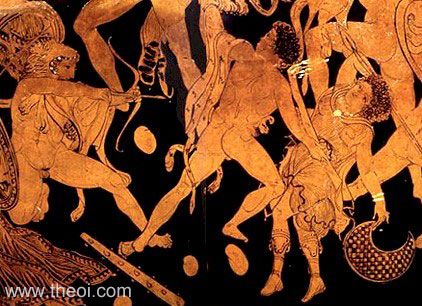
Pseudo-Apollodorus, Bibliotheca 1. 36 (trans. Aldrich) (Greek mythographer C2nd A.D.) :
"The greatest of them [the Gigantes (Giants)] were Porphyrion and Alkyoneus (Alcyoneus) . . . In the course of the battle [of gods and giants] Porphyrion rushed against Herakles (Heracles) and also Hera. Zeus instilled him with a passion for Hera, and when he tore her gown and wanted to rape her, she called for help, whereat Zeus hit him with a thunderbolt and Herakles slew him with an arrow."
Pindar, Pythian Ode 8 ant1 - ep1 (trans. Conway) (Greek lyric poet C5th B.C.) :
"Porphyrion even he knew not your [Zeus'] strength when he provoked you beyond all measure . . . But violence brings ruin even the boastful hard-heart soon or late. Kilikian (Cilician) Typhon of the hundred heads could not escape his fate, nor could even the great king of the Gigantes (Giants) [Porphyrion], but by the thunderbolt they were laid low, and by Apollon's shafts."
Aristophanes, Birds 1249 ff (trans. O'Neill) (Greek comedy C5th to 4th B.C.) :
"[Comedy in which the Birds threaten to besiege heaven :] I shall send more than six hundred porphyrions [purple-coots or water-hens] clothed in leopards' skins up to heaven against him; and formerly a single Porphyrion [the Gigante] gave him enough to do." [N.B. The giant Porphyrion shared his name with the purple-coot (Greek porphyrion).]
Ptolemy Hephaestion, New History Book 2 (trans. Pearse) (summary from Photius, Myriobiblon 190) (Greek mythographer C1st to C2nd A.D.) :
"Herakles, says the author [Hephaestion], was called Neilos at his birth; then, when he saved Hera in killing the nameless Gigante (Giant) with the fiery breath who attacked her, he changed his name because he had escaped the danger of Hera."
Pseudo-Hyginus, Preface (trans. Grant) (Roman mythographer C2nd A.D.) :
"From Nox (Night) [Nyx] and Erebus (Darkness) [were born]: . . . Epiphron, Porphyrion, Epaphos [amongst a list of giants and abstractions]."
Nonnus, Dionysiaca 25. 85 ff (trans. Lind) (Greek epic C5th A.D.) :
"Bakkhos (Bacchus) [Dionysos] repaid the stubble of snakehaired Gigantes (Giants), a conquering hero with a tiny manbreaking wand, when he cast the battling ivy against Porphyrion, when he buffetted Enkelados (Enceladus) and drove Alkyoneus (Alcyoneus) with a volley of leaves."
Nonnus, Dionysiaca 48. 6 ff :
"[Gaia the Earth] goaded her own sons to battle : ‘My sons, make your attack with hightowering rocks . . . [and I will] bestow Hebe on [Gigante] Porphyrion as a wife, and give Kythereia (Cytherea) [Aphrodite] to [Gigante] Khthonios (Chthonius), when I sing Brighteyes [Athene] the bedfellow of Enkelados (Enceladus), and Artemis of Alkyoneus (Alcyoneus) . . . ’ With these words she excited all the host of the Gigantes (Giants)."
ANCIENT GREEK ART
SOURCES
GREEK
- Pindar, Odes - Greek Lyric C5th B.C.
- Aristophanes, Birds - Greek Comedy C5th - 4th B.C.
- Apollodorus, The Library - Greek Mythography C2nd A.D.
- Ptolemy Hephaestion, New History - Greek Mythography C1st - 2nd A.D.
- Nonnus, Dionysiaca - Greek Epic C5th A.D.
OTHER SOURCES
Other references not currently quoted here: Horaius Carmina 3.4.54, Claudian Gigantomachia 114.
BIBLIOGRAPHY
A complete bibliography of the translations quoted on this page.
